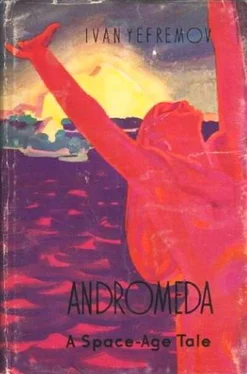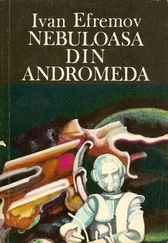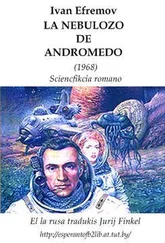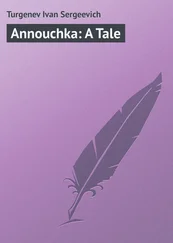Ivan Yefremov - Andromeda (A Space-Age Tale)
Здесь есть возможность читать онлайн «Ivan Yefremov - Andromeda (A Space-Age Tale)» весь текст электронной книги совершенно бесплатно (целиком полную версию без сокращений). В некоторых случаях можно слушать аудио, скачать через торрент в формате fb2 и присутствует краткое содержание. Город: Moscow, Год выпуска: 1959, Издательство: FOREIGN LANGUAGES PUBLISHING HOUSE, Жанр: Фантастика и фэнтези, на английском языке. Описание произведения, (предисловие) а так же отзывы посетителей доступны на портале библиотеки ЛибКат.
- Название:Andromeda (A Space-Age Tale)
- Автор:
- Издательство:FOREIGN LANGUAGES PUBLISHING HOUSE
- Жанр:
- Год:1959
- Город:Moscow
- ISBN:нет данных
- Рейтинг книги:5 / 5. Голосов: 1
-
Избранное:Добавить в избранное
- Отзывы:
-
Ваша оценка:
- 100
- 1
- 2
- 3
- 4
- 5
Andromeda (A Space-Age Tale): краткое содержание, описание и аннотация
Предлагаем к чтению аннотацию, описание, краткое содержание или предисловие (зависит от того, что написал сам автор книги «Andromeda (A Space-Age Tale)»). Если вы не нашли необходимую информацию о книге — напишите в комментариях, мы постараемся отыскать её.
Andromeda (A Space-Age Tale) — читать онлайн бесплатно полную книгу (весь текст) целиком
Ниже представлен текст книги, разбитый по страницам. Система сохранения места последней прочитанной страницы, позволяет с удобством читать онлайн бесплатно книгу «Andromeda (A Space-Age Tale)», без необходимости каждый раз заново искать на чём Вы остановились. Поставьте закладку, и сможете в любой момент перейти на страницу, на которой закончили чтение.
Интервал:
Закладка:
Evda Nahl placed her strong, warm hand on Darr Veter’s.
“What dream have you renounced today?” At first Veter wanted to put her off, but realized that with Evda equivocation was impossible. And so he pretended to be absorbed in the artist’s discourse.
“Those who have seen the mass art of the past,” continued the artist, “cinema films, recordings of theatre shows, exhibitions of pictures, know how marvellously refined, elegant, purged of all superfluities our present-day spectacles, dances and pictures seem by contrast. I am not comparing them with the periods of decay, of course.”
“He’s clever but too verbose,” whispered Veda Kong. “It’s difficult for an artist to express in words or formulas those complicated phenomena that he sees and selects from his environment,” Chara Nandi said in his defence and Evda Nahl nodded approvingly.
“What I want to do is something like this,” continued Cart Sann, “I want to collect into one image the pure grains of the wonderful genuineness of feeling, form and colour scattered among many people. I want to restore the ancient images by the highest expression of the beauty of each of the races of the distant past that have gone into the makeup of mankind today. The Daughter of Gondwana is unity with nature, a subconscious knowledge of the connections between things and phenomena, a complex of senses and feelings interlaced with instincts.
“The Daughter of Thetis, the Mediterranean, has strongly developed emotions that are fearlessly expansive and infinitely varying; here there is a different degree of the union with nature, through emotions, the power of Eros — that is how I imagine her. The ancient civilizations of the Mediterranean, the Cretan, Etruscan, Hellenic and Proto-Indian — gave rise to the type of man who, alone of all others, could have created that civilization that stemmed from the rule of woman. I had the best of luck when I discovered Chara: she is by pure accident a combination of the traits of ancestors from amongst the Graeco-Cretans of antiquity and the later peoples of Central India.”
Veda smiled at the correctness of her guess and Darr Veter whispered to her that it would be hard to find a better model.
“If my Daughter of the Mediterranean turns out a success then I must go on to the third part of the plan — I must paint the golden- or flaxen-haired northern woman, with her calm and transparent eyes, tall, somewhat slow in her movements, her glance straightforward as she looks out at the world like one of the ancient Russian, Scandinavian or English women. Only when that is finished shall I be able to start on the synthesis, the image of the present-day woman in which I shall have to portray the best features of each of those ancestors.”
“Why do you only paint ‘daughters’ and no ‘sons’?” asked Veda, smiling mysteriously.
“Is there any need for me to explain that by the laws of physiology the beautiful is always more finished and more refined in woman?” frowned the artist.
“When you are ready to paint your third picture, your Daughter of the North, take a good look at Veda Kong,” began Evda Nahl, “you’ll hardly….”
The artist rose swiftly to his feet.
“D’you think I’m blind? I am struggling against myself to prevent that image becoming part of me at a time when I am full of another. But Veda….”
“Is dreaming of music,” continued Veda. “What a pity there is only a solar piano here and it’s silent at night.”
“Is that the piano with a system of semi-conductors that works from sunlight?” asked Renn Bose, leaning over the arm of his chair. “If it is, I can switch it over to use the current of the receiver.”
“Will it take long?” asked Veda, pleased at the opportunity.
“It would take about an hour.”
“Then don’t bother. The news broadcast on the world circuit begins in an hour and we want to see and hear it. We’ve been busy the past two evenings and haven’t switched on the receiver.”
“Then sing us something, Veda,” asked Darr Veter. “Cart Sann has the eternal stringed instrument, the one that dates back to feudal society in the Dark Ages.”
“Guitar,” guessed Chara Nandi.
“Who’ll play? I’ll try myself, perhaps I can manage.”
“I’ll play.” Chara Nandi volunteered to go for the guitar.
“We’ll run together,” suggested Frith Don. Chara roguishly tossed back her mass of black hair. Sherliss pulled a lever moving back the side wall of the verandah giving them a view of the eastern corner of the bay. Frith Don ran with long strides. Chara ran with her head thrown back and soon fell behind but in the end they arrived at the studio together, plunged into the un-lighted entrance and a second later reappeared to skim along the edge of the sea, stubborn and swift-footed. Frith Don was the first to reach the verandah but Chara vaulted over the open side partition and was first in the room. Veda clapped her hands in admiration. “But Frith Don won last year’s decathlon!” “And Chara Nandi was graduated from the Higher School of Dance, both departments. Ancient and Modern,” retorted Cart Sann, in the same tone.
“Veda and I studied dancing too, but only in the lower grades,” sighed Evda Nahl.
“Everybody passes the lower grade nowadays,” said the artist teasingly.
Chara ran her fingers lightly over the strings, sticking out her small, firm chin. The guitar hummed low, pensive notes. The young woman’s high-pitched voice combined longing and challenge. She sang a new song, one that had just come from the southern zone, a song of an unfulfilled dream. Veda’s low contralto joined in and became the beam around which Chara’s voice coiled and quivered. It was a magnificent duet, the two singers were absolute opposites and yet they complemented each other perfectly. Darr Veter turned his gaze from one to the other unable to decide to whom the singing was most becoming — Veda, who stood leaning her elbows on the receiver and her head bowed under the weight of a mass of blonde hair that glittered silver in the moonlight, or Chara, leaning forward with the guitar on her round, bare knees, with a face tanned by the sun in which the white of her teeth and the bluish whites of her eyes stood out in sharp contrast.
The song finished, Chara picked idly at the strings. Darr Veter clenched his teeth — she was strumming the song that had once separated him from Veda, a song that was now painful to her, too.
She plucked at the strings spasmodically, the chords following each other and dying before they could merge. It was a jerky melody, like the splashes of waves falling on the beach, spreading over the sand for an instant and then rolling back, one after another, to the black depths of the sea. Chara was quite unaware of anything, her clear voice gave life to the words of love that flew out into the icy void of the Cosmos from star to star, trying to find, to understand, to feel where he was… he who had gone into the Cosmos for the great deed of discovery — he would never return — let it be so, if only for one moment.she could know what was happening to him, help him with a whispered word, a kind thought, a greeting!
Veda remained silent and Chara felt there was something wrong, she broke off the song, jumped up, tossed the guitar to the artist and went over to where the fair-haired woman was standing, her head bowed guiltily.
Veda smiled.
“Dance for me, Chara.”
The latter nodded obediently but Frith Don stopped her.
“The dances can wait, there’s a transmission beginning now."
On the roof of the building a telescopic pipe was put up on which there were two metal sheets at right angles to each other surmounted by a circular structure with eight hemispheres arranged around its circumference. The room was filled with the mighty sounds of the world information service.
Читать дальшеИнтервал:
Закладка:
Похожие книги на «Andromeda (A Space-Age Tale)»
Представляем Вашему вниманию похожие книги на «Andromeda (A Space-Age Tale)» списком для выбора. Мы отобрали схожую по названию и смыслу литературу в надежде предоставить читателям больше вариантов отыскать новые, интересные, ещё непрочитанные произведения.
Обсуждение, отзывы о книге «Andromeda (A Space-Age Tale)» и просто собственные мнения читателей. Оставьте ваши комментарии, напишите, что Вы думаете о произведении, его смысле или главных героях. Укажите что конкретно понравилось, а что нет, и почему Вы так считаете.











